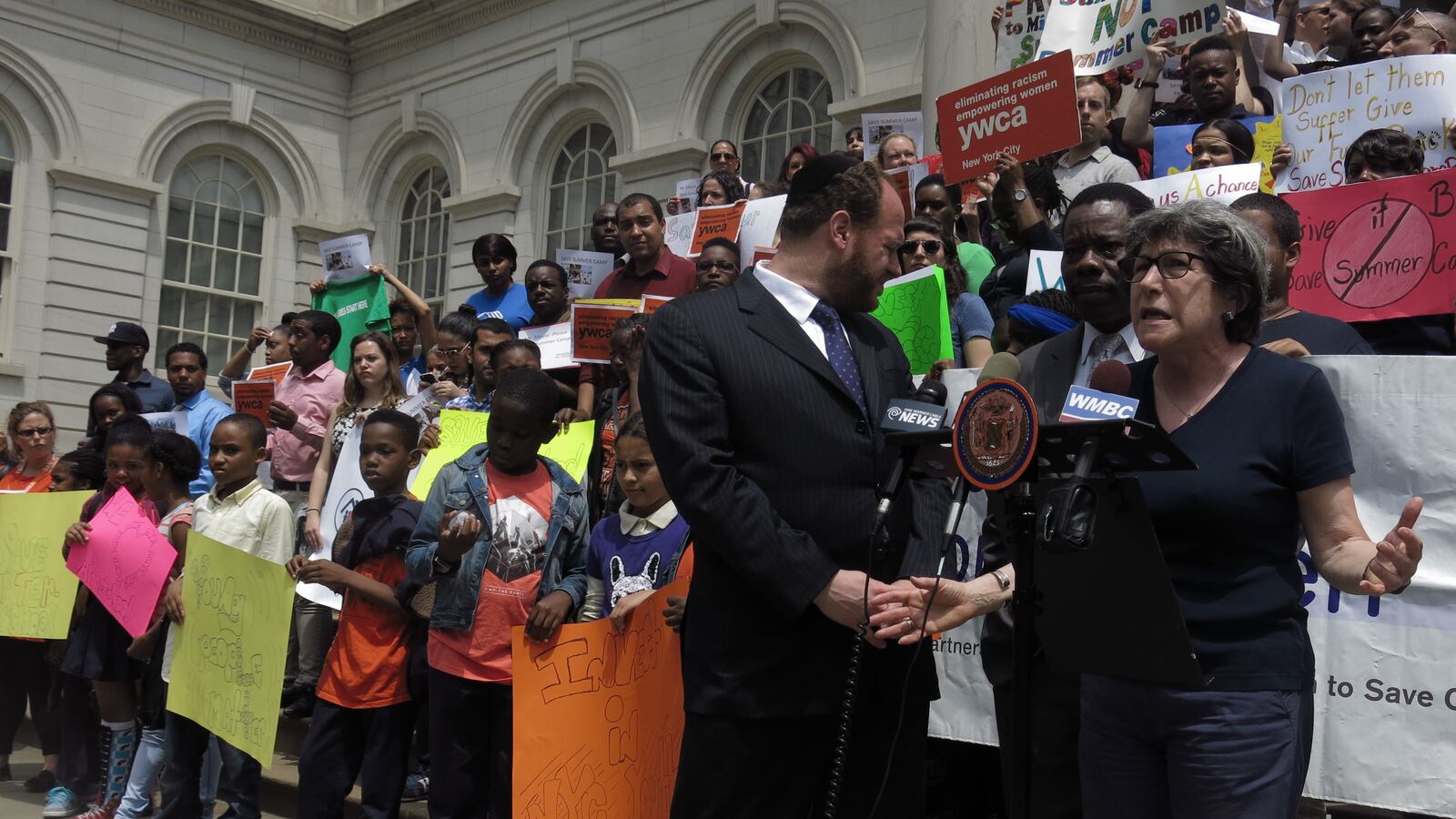Education officials struggled to explain an abrupt cut to middle-school summer programs at a budget hearing Thursday, as pressure mounted for the city to restore funds to avoid layoffs and cancellations.
Chancellor Carmen Fariña told council members she thought they would see a resolution “soon” to the cuts, which advocates and program directors estimated will affect at least 35,000 children and were first reported by Chalkbeat. It was the de Blasio administration’s first acknowledgement that officials were negotiating to restore the funds, but program directors and council members said they were still waiting for details.
“It’s totally creating havoc in many families’ lives, and it’s incredibly frustrating for us from the council’s perspective,” said Julissa Ferreras, who chairs the council’s finance committee.
Fariña did not elaborate when Ferreras and other council members asked why the cuts happened after money was allocated and program directors had begun hiring staff and enrolling students.
“Well, this is obviously something we’re working on,” said Fariña, who then deferred questions to the department’s chief financial officer, Raymond Orlando. Orlando also did not offer insight into the timing, but said the money would benefit struggling schools that were starting up their own after-school and summer programs.
That was one of many instances during Thursday’s hearings when council members expressed frustration with the education department’s budgets, which total $34.5 billion. The council is charged with overseeing the city’s spending and budgeting, but Ferreras said that process had been “completely hampered” because the city was two months late submitting its proposed five-year capital budget.
But it was the maneuver to cut funding to after-school summer programs that roused the most criticism. In the middle of Fariña’s testimony, several council members left to join a rally outside City Hall organized by a coalition of organizations affected by the cut.
“Mayor de Blasio, ‘We’re looking into it’ is not an answer,” said Council member Helen Rosenthal, who said a program planned for a NYCHA development in her district lost 64 seats.
After-school program directors say they were cut off guard by the cuts. The Department of Youth and Community Development had told them months earlier that they had been granted additional funding to continue their programs over the summer, extending the de Blasio administration’s signature after-school initiative.
Earlier this month, the providers were told that the money had been redirected to support the city’s program to turn around 94 struggling schools. Programs not affiliated with public schools were also cut, including Beacon community centers and the Cornerstone programs that operate in public housing. The Campaign for Children, a 150-member coalition of early education and after-school groups, says it still has not been told how many programs were affected.
The cuts totaled $27.7 million, according to the council’s analysis of the budget. All told, $55.5 million in after-school funding will be redirected, according to a report from the Independent Budget Office.
It is the city’s second round of budget hearings since Mayor Bill de Blasio came into office. While the City Council and the administration remained aligned politically, the tension showed that some of the goodwill afforded to the administration during last year’s budget negotiations was wearing off.
Still, the hearing was friendly in comparison to the testy budget meetings during the Bloomberg administration, when officials often withheld funding to social-service programs to gain leverage in final budget negotiations.
“We don’t want to negotiate in this fashion,” Ferreras said. “We were supposed to be eliminating the budget dance. We were supposed to be eliminating these moments of contention because we’re all in this together.”
Fariña’s hints at a coming resolution did little to reassure the after-school providers, who said they had not received an indication from the administration that it would be settled this week. Advocates cautioned the city last week that they need assurances by Friday in order to have enough time to get background checks for new staff, buy art supplies, and book field trips by the time programs begin on July 6.
“Without a commitment of a solution, we have to start the wheels turning to cancel everything,” said Michelle Yanche, an assistant executive director at Good Shepherd Services, which stands to lose 750 seats across 11 programs. “And once those wheels are set in motion it is really not possible to change course again to pull off a quality program in any kind of timely way.”
Four of those programs would have operated in public housing projects, Yanche said. Two programs operate in developments the city has deemed its most violent, leaving Yanche concerned for the safety of children she had planned to serve.

